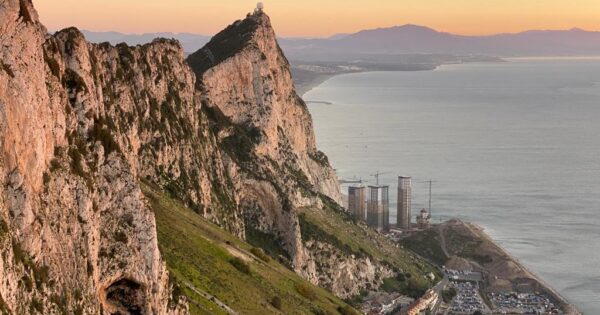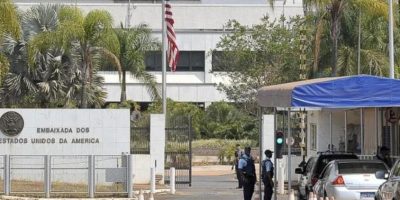A letter from Spain’s Minister for Foreign Affairs to a Campo environmental group on the Eastside project triggered a response from the Gibraltar Government on Monday, which said “no amount of political posturing” would alter the “indisputably British” sovereignty of the waters around the Rock.
No.6 Convent Place was responding after Spain’s Jose Manuel Albares urged the Junta de Andalucia to take “robust” steps over exports of rocks destined for the Eastside development, a project he said contravened Spain’s EU-derived environmental legislation and impinged on its sovereignty and territorial integrity.
Mr Albares reflected his views in a letter to Antonio Muñoz, the spokesman for Spanish environmental group Verdemar-Ecologistas en Acción, which for months now has publicly raised concerns about the Eastside project and shipments of rocks from quarries in the province of Malaga.
In his letter to Mr Muñoz, which was first reported by Campo newspaper Europa Sur on Monday, Mr Albares suggested that the quarrying activity in Malaga were having a “serious impact on protected habitats” in the municipalities of Casares and Manilva.
Mr Albares said too that the Spanish Ministry for Foreign Affairs had last August made a diplomatic protest to the UK over the Eastside project.
The protest, in the form of a note verbale, “…reiterated that any construction or reclamation in spaces that were not ceded under the Treaty of Utrecht constitute a violation of Spain’s sovereignty and territorial integrity,” Mr Albares said in the letter to environmental group.
“We also reiterated that the Eastside project infringes environmental legislation…”
Mr Albares said he had been in contact with the President of the Junta de Andalucia, Juan Manuel Moreno, since last October, urging him to take “robust environmental measures” and “become fully involved” within his areas of competency to oppose the reclamation in Gibraltar.
“In that respect, I wrote [to Mr Moreno] on those terms this very month of December and highlighted the need for the Junta de Andalucia to become involved in this issue” the letter added.
Mr Albares said he had also raised the issue with Sara Aagesen, Spain’s Minister for Ecological Transition and the Demographic Challenge, underlining the need for inter-ministerial coordination “to respond to this issue of great concern”.
‘ILL-INFORMED BLUSTER’
Mr Albares hinged his arguments on Spain’s official view that the waters around the Rock are Spanish and protected under EU legislation by a Spanish-managed conservation site which, until Brexit, had overlapped with a UK-managed site in the same waters.
No.6 Convent Place noted that the Spanish conservation site inside British waters had no bearing on sovereignty of the waters and had been “a totally unacceptable and aggressive act” when it was first designated some years ago.
It said the United Nations Convention on the Law of the Sea [UNCLOS] provided for a three-mile territorial sea generated by every coastal state, with the possibility to claim up to twelve miles where geography allows.
“In the case of Gibraltar, in international law, this means three miles to the east and the south and the median line in the Bay, although the UK is entitled to claim those twelve miles where possible,” No.6 said.
“The Spanish Declaration entered in UNCLOS simply records the traditional political view of Madrid and it has no binding legal effect of any kind.”
“In this context, it is worth recalling that a top legal adviser to the Spanish Foreign Ministry itself, Jose Antonio de Yturriaga, published a paper on retirement which indicated that Madrid’s claim to Gibraltar’s territorial sea was weak had no legal basis.”
“All this means that the Eastside project is without question in British Gibraltar Territorial Waters, despite the ill-informed bluster on the Spanish side.”
The Gibraltar Government said the development would generate millions “if not billions” of euros in Spain and in Andalucia in particular, through the purchase of goods and materials as well as in the employment of hundreds of people both while the project is under construction and when it is finally built.
“More than one person should understand that this is part of the positive economic contribution which Gibraltar continues to make to the Spanish economy,” it added.
“It goes without saying that Gibraltar will always continue to act in its waters in keeping with the highest international standards of environmental protection, which are higher than those applicable in Spain itself, and in keeping with the rules on the transboundary effects of land reclamation projects, as we have always done.”
“This is not the same on the Spanish side, where the lack of consultation of land reclamation on that part of the Bay has had a negative impact on the coast of both Gibraltar and La Linea during winter storms.”
“Additionally, it will be recalled that during our period of EU membership, on Spanish complaints, the EU Commission investigated the Eastside project on more than once occasion.”
“Each time the EU found that Gibraltar had done everything properly and by the book, in full compliance with the law.”
“It is also very odd that Madrid should seek to resurrect this matter at this particular moment in time, when it was long done and dusted from an EU perspective, and when it has been clear for over 20 years that the land use on that site was precisely for a mixed project of this nature.”
ALBARES AT ODDS WITH INTERIOR MINISTRY
The position set out by the Spanish Foreign Minister in his letter to Verdemar-Ecologistas en Acción was at odds with both Spain’s Ministry of the Interior, which is responsible for customs controls Spain’s borders, and the Junta de Andalucia.
The Interior Ministry last August said it had no record of any irregularities related to the transit of stones and aggregates from Spain to Gibraltar, adding it was unaware whether the materials were specifically used in the Eastside project.
The Interior Ministry reported that between 2020 and 2024, over 2,500 truck movements transported a total of 61,711 metric tons of stones and aggregates.
It said there were no restrictions on this trade and that customs inspections by Guardia Civil officers in La Línea had found no infractions.
The Junta had likewise earlier told Verdemar-Ecologistas en Acción the rocks and aggregates from Andalusian quarries were above board and complied with applicable national and international laws.














